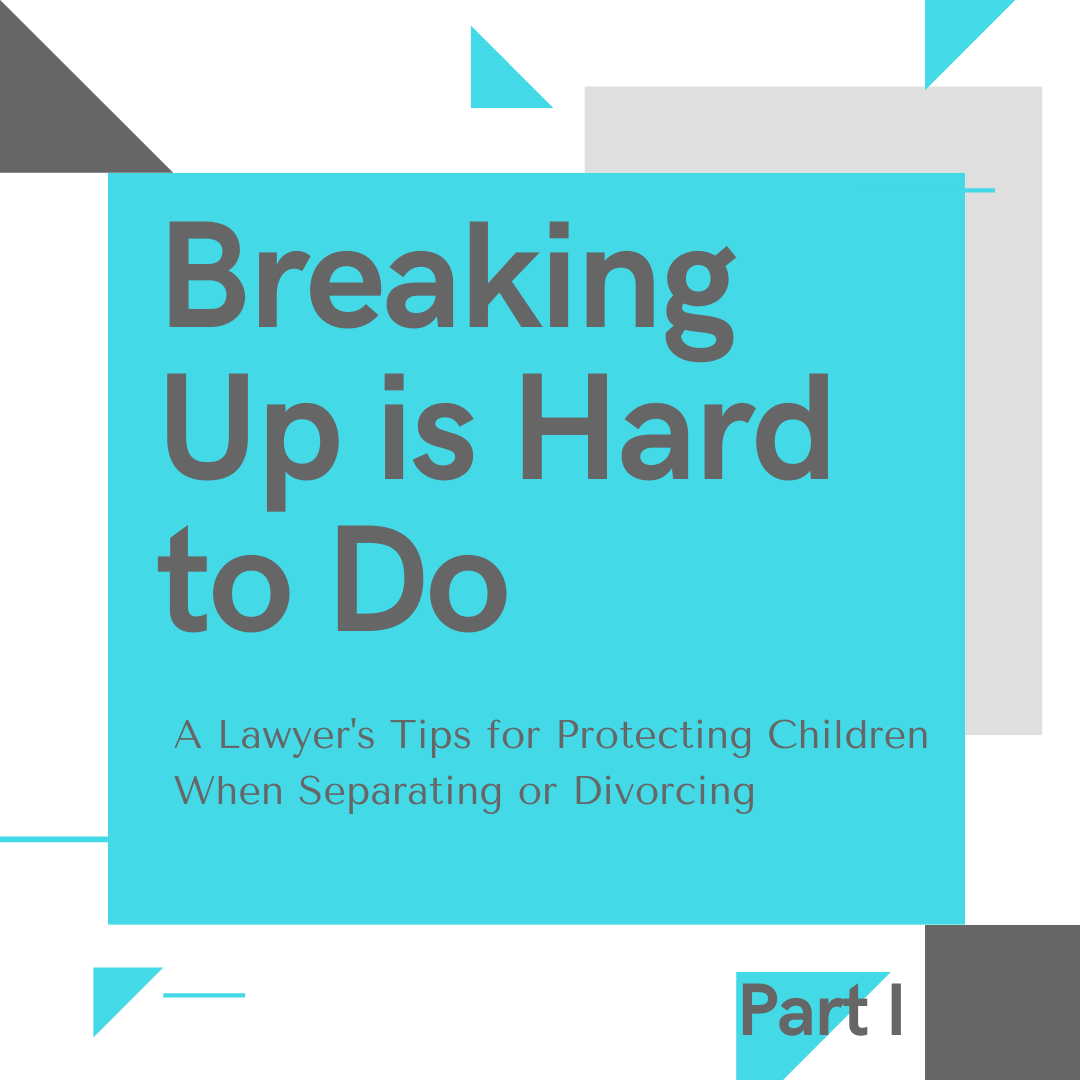Breaking Up Is Hard To Do, Part I: Communication Tips
How To Protect Your Children When Separating or Divorcing
Nearly all of us have heard about how damaging separation and divorce can be for the children of parents going through it, but there are things that can be done to minimize harm. Today we invite Missoula attorney Janel F. Chin of Peaks and Valleys legal services to offer some suggestions for those facing separation or divorce:
Allow Yourself to Grieve. It is normal to feel disappointment, stress and grief over a failed romantic relationship. Often those going through a separation of divorce are grieving the loss of shared experiences, financial, intellectual, social or emotional support as well as the loss of hope, plans and dreams they may have shared with their ex. Sadness, anger, exhaustion, frustration, resentment, fear and confusion are all common feelings. Accept that you may feel anxious about the future. Consider joining a support group to connect with others in similar situations.
If You Don’t Have Anything Nice To Say Then It’s Better to Say Nothing At All. When you speak negatively about your co-parent to your child(ren), they may feel like they have to choose a parent to side with and at the very least are likely to feel burdened by your negativity—allow them to develop a relationship with their parent free from your negativity.
Listen. Encourage your child(ren) to share their feelings and really listen to them. They may be feeling sadness, loss or frustration about things you may not have expected. Your co-parent and your child(ren) should be given the opportunity to share their viewpoints fully. Even if you ultimately cannot agree with them, conveying that you understand their point of view can go a long way toward improving your relationships. For instance, a child who felt heard during the process of developing a parenting plan is more likely to cooperate when it is time to transition between homes.
Check Your Emotions. If your co-parent does or says things that are upsetting to you think about your child(ren)’s needs and how you might both better address them before engaging in a conversation about the upsetting words or actions. Then try using the phrases: “Would you be willing to…” or “Can we try…” to suggest changes to your co-parenting—even if it is within your right to make a demand, avoid it as demands are often misinterpreted and can lead to further conflict.
Ask Your Co-Parent For Their Opinion. This is a simple way to jump-start positive communications. Start with something that you do not feel strongly about and ask your ex for input and demonstrate with your response that you value their opinion.
Apologize. Even if you must go back to something you did or said a long time ago, if there is anything you feel sorry about APOLOGIZE as apologies can be a powerful impetus to improve communications.
Keep Your Co-Parent Informed. If you are the parent who attends more medical appointments or receives more communications from your child(ren)’s school, make an effort to keep your co-parent informed.
Be Consistent With Discipline. Try and be on the same page as your co-parent with regard to rules, discipline and rewards between households, it will benefit your children as they will know what to expect and what it expected from them.
Be Attentive To Your Child(ren)’s Needs. By noticing your child(ren)’s moods, telling them that whatever they say is okay and helping them to find words for their feelings you can help them be honest without fear of hurting you.
Acknowledge your child’s feelings; it is okay that you are not able to change them.
Keep laughing, humor is a great way to connect with your child(ren) and relieve stress for everyone.
If your child’s emotional health seems to be getting worse with time consider counseling for them. Good reasons to seek help ou’re your child(ren) include:
trouble sleeping
poor concentration
trouble at school
abuse of alcohol or other drugs
self-harm including disordered eating or cutting
frequent, angry or violent outbursts
withdrawal from loved ones and activities
There are professionals who specialize in working with children of various ages and stages and who are highly skilled at incorporated fun and play into their therapy. Doctors, teachers and school counselors all can provide you with information and guidance.
As children age and mature then may have new questions, feelings or concerns so make talking about separation/divorce an ongoing process.
Adopt a ‘Separate Relationships’ Mindset. Moving forward think of your personal relationship with your ex as separate from the parenting relationship that you will have with them going forward. The terms many of us who work with families going through divorce use to describe the relationship separated or divorced couples have for the sake of their child(ren) is “co-parenting.”
Think of your relationship with your co-parent as a brand new one where ideally you are both focused on what is best for your child(ren).
This suggested mindset should extend to the way you speak about your co-parent when your child(ren) are present. Do not vent to your child, instead try writing in a journal, venting to a pet, trusted friend, or therapist. Finding a routine of self-care with a healthy eating, exercise and plenty of rest can help you process the difficult aspects of your separation or divorce without venting to your child(ren).
Do not have your child(ren) convey messages to your co-parent. Child(ren) easily feel caught in the middle of their parents’ conflicts and it is inappropriate to place the burden of communications on them. Hire a professional who specializes in this communication such as a therapist, mediator or attorney if you are unable to handle communicating directly.
Peaceful, consistent and purposeful communication with your co-parent should be the goal. Mentally prepare yourself to keep your focus on your child(ren)’s best interests before contacting your co-parent. If in-person, conflict-free communication is not possible for you and your co-parent, then commit to speaking over the phone or exchanging text messages or email.
Your child(ren) are entitled to know why you are separated or getting a divorce, but keep your explanation short and simple such as: “We can’t get along anymore, but it does not change how much we both love you” as too much detail can easily overwhelm. Ideally this conversation will happen before changes in the child(ren)’s living arrangements happen and both co-parents will be on the same page and describe the separation or divorce in the same way. Older child(ren) often need more information than younger ones especially logistical information about changes in their living arrangements, school, or activities.
Things to Try Before Filing a Court Action. It can be helpful to bring in a third party skilled in conflict resolution such as a mediator or therapist before filing a court action when you and your co-parent are not able to agree on something you feel is important to your child(ren)’s wellbeing. Judges often must make decisions quickly and with limited information which often leads to decisions that no one involved is happy with. Reviewing your parenting plan periodically and bringing in a third party to assist with conflicts can often lead to more favorable results.
Address Ongoing Negative Emotions. If you do not feel you are making any forward momentum emotionally, you may want to be sure that you are not suffering from depression which is a treatable emotional condition. Isolating yourself can make things worse remember that the ultimate goal is to move forward beyond negative feelings so seek support when you can.


